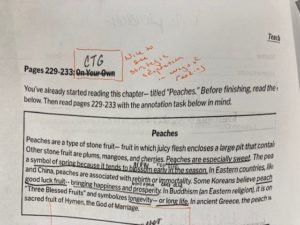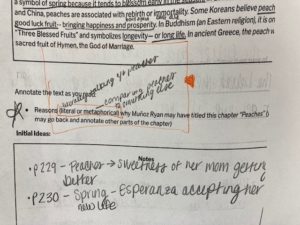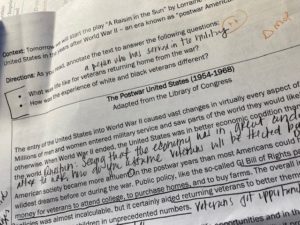04.04.22Examples of Lesson Preparation and Adaptation from Teachers at Believe Memphis Academy
I had the pleasure of visiting a few schools in Memphis last week with Darryl Williams, Teneicesia White and Joaquin Hernandez, including Believe Memphis Academy, which uses our Reading Reconsidered English Curriculum. Among the many highlights were some of the great lesson preparation moves teachers used to get ready to teach (and adapt!) the units.
For example we loved the way fourth grade teacher Starr Garrett (using our fifth grade Esperanza Rising Unit) changed a accountable independent read to a FASE (or, as we used to call it, Control the Game [CTG] read.)

One of the best ways to make a challenging text come to life for students–but to keep the challenging text–is to read it with them, the teacher reading some and modeling expressive fluency and students practicing developing the same. Great move by Starr here!
We also loved the way Starr prepared in advance for areas of potential misunderstanding. She had, in TLAC parlance, anticipated error.

Here she’s anticipated that two terms teachers are deeply familiar with–literal and metaphorical meanings–might be unclear to students so she scripted in quick and accurate kid-friendly definitions, just like you’d do with vocabulary. (In case you can’t read it the question asks students to annotate for literal and metaphorical reasons why Pam Munoz Ryan might have titled her chapter “Peaches.” Starr’s notes say, for literal, “We’re really talking about peaches,” and for metaphorical, “comparing peaches to something else.”
Upstairs, Starr’s colleague Dominique Clark was using our A Raisin in the Sun unit. It included a nonfiction passage about post-WWII economic domestic economic conditions. As she prepped she did several insightful things.

First, she too anticipated a word that is obvious to adults but might not be to students: “veteran.” She jotted a quick, precise kid-friendly definition into her packet.
Then as you can see, she prepared carefully for ways that students might not fully grasp the article’s meaning given that some would probably lack background knowledge. She wrote out a few “back pocket questions” (BPQs) that she could use in case they were confused. Having thought of them in advance allowed her to make them precise and useful. “Seeing that the economy was in great condition after the war, how do you assume veterans will be treated back home?” she wrote.
Later, she paraphrased a tricky passage–“it certainly aided veterans to better themselves…”–with a gloss she would use with students: “veterans got opportunities to make themselves better and provide for their families.”
Lots of times when we show video of a great lesson the assumption is that all of the work is done in the moment by a great teacher. These examples from Starr and Dominique’s classrooms show how critical preparation–asking: How will I deliver this lesson? and What will be challenging for students?–is for success!
